Home » Archives for January 2014
Comedians mock storm fallout
Posted by Unknown
Bursting the 'Bieber Bubble'
Posted by Unknown
Why Knox verdict baffles America
Posted by Unknown
Editor's note: Nina Burleigh is an investigative journalist and author. Her last book is "The Fatal Gift of Beauty: The Italian Trials of Amanda Knox."
(CNN) -- When Amanda Knox was convicted again on Thursday, Americans reacted with bafflement. The appeal was the third round through Italy's grinding, multi-level legal system, with its numerous checks and balances. But the saga is also confusing because, while the crime is simple, the case built around it is a grand spectacle combining aspects of national pride, sexist archetypes and race.
Knox and her co-defendant, Raffaele Sollecito, were first convicted by a jury in 2009 for the murder of British student Meredith Kercher in 2007. An appellate judge overturned the conviction in 2011 and Knox returned to the United States after four years in jail. The prosecutor then appealed the acquittal to the Italian Supreme Court, which sent the case to the new appellate panel that reinstated the conviction.
It isn't over yet. The defendants will now appeal and the case eventually could be returned to another appellate panel for yet another review.
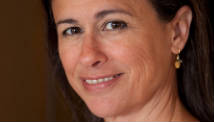 Nina Burleigh
Nina Burleigh I spent two years researching and writing a book about the Knox case, living in Perugia, attending the trial, interviewing every lawyer involved in the case, reviewing thousands of pages of police documents and court transcripts, interviewing forensic police, coroners, the principles of the case, their family members and associates.
Americans like me who believe the case against Knox and her then-boyfriend is fatally flawed have been accused of disliking Italy or disrespecting its judicial system. But what has happened in the Amanda Knox case is not an Italian problem. When prosecutors make mistakes anywhere in the world, they don't like to admit it. It takes an exceptionally brave and wise "Solomon" to reframe a case after arresting the wrong people.
The latest Italian proceeding did not involve any new evidence and, sadly, didn't shed any new light on the crime. There is still no proof that Amanda Knox was in the bedroom where someone stabbed Meredith Kercher. The DNA and fingerprint evidence is still entirely linked to a man named Rudy Guede, who is serving a 16-year jail sentence for the murder -- shortened thanks to testimony that put Amanda Knox on the crime scene.
After he arrested them, the trial prosecutor proposed that the motive was a post-Halloween ritualistic sex game. But when authorities soon realized the DNA and fingerprints in the murder room belonged to neither Knox nor Sollecito, rather than reframing their case, the small town prosecutors and police in the glare of international media dug in their heels. In the latest proceeding, a new prosecutor abandoned the sex game motive but suggested Knox murdered Kercher after an altercation over Knox's poor hygiene and sloppy housekeeping.
In other words, out with Satan and in with the dirty laundry.
 Amanda Knox convicted of murder again
Amanda Knox convicted of murder again 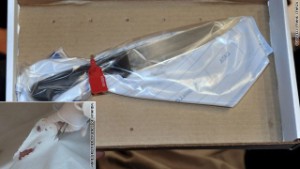 DNA expert: Science was ignored for Knox
DNA expert: Science was ignored for Knox  Dershowitz: Lots of evidence against Knox
Dershowitz: Lots of evidence against Knox With no hard evidence and no credible motive, spectators around the world are right to wonder what's going on in these Italian courtrooms.
Rudy Guede has never denied watching Meredith Kercher bleed to death, and he left a bloody handprint in the victim's blood on her wall. According to testimony from Italian forensic police, his DNA was inside the victim—although it was not clear whether there was a sexual assault. In his prison writings and in his testimony at his appeal, he talked of how difficult it was for him to get the image of the blood that flowed from Meredith out of his head.
Did this garish confession shock the Perugian authorities and courthouse press corps into trying to ascertain just who and what this young man was? On the contrary, he apparently elicited mercy, and had his sentence cut in half. He may well be walking free before the Knox case is settled.
In his first comments on the case, before he was captured, Guede was surreptitiously recorded by Perugia police in a Skype conversation with a friend, according to police wiretap transcripts in the trial record, saying that Knox had nothing to do with it. But as soon as he was connected with a defense lawyer, he started to change his story.
It's a trope of the case that Knox (and Sollecito) had a P.R. machine, vast amounts of money and great legal defense, while Guede was legally under-served. In fact, his attorney was one of the busiest criminal defense lawyers in Perugia, well-connected with the prosecution, with a career behind him handling hundreds if not thousands of local crimes, often involving drugs and violence.
Prosecutors' reluctance to deeply investigate Guede is understandable; they don't want to know. But Guede may be the most interesting character in the story. Born in Ivory Coast, brought to Italy at age 5, he is more Italian than most immigrants, but, like other immigrants, he is legally just a guest in the homogenous country, not a citizen, required to report to the authorities annually (which was why his fingerprints were on file in Perugia).
In the months before the Kercher murder, Guede was broke and showing signs of mental illness, and was involved in three and possibly more home invasions, according to police reports, trial testimony and interviews with victims.
His apparent modus operandi was to break into what he thought were empty houses and make himself at home. A few weeks before the Kercher murder, someone broke into a Perugia law office through a second floor window, according to trial testimony from the lawyer who practiced there, turned up the heat, rearranged small trinkets, drank an orange soda from the refrigerator and appeared to have slept on the couch before making off with a laptop.
At a nursery school in Milan a week later, director Maria Antonietta Salvadori Del Prato, walked in on a Saturday and found Guede sitting at her desk, she told me in an interview. She called police. They found the stolen laptop and a knife in his pack. Del Prato suspected he might have gotten a key to the nursery school from one of her employees who frequented the Milan club scene. Del Prato told me she believed he spent a night on the children's cots and cooked a pot of pasta in the kitchen, then placed it in little bowls around the room.
From that interview and many more, I pieced together a picture of a young man who seemed to be acting out some sort of fantasy of a home, a fantasy that perhaps abruptly cracked when Meredith Kercher came home unexpectedly while he was burgling her house, and unwittingly locked herself into the house with him. (Guede has maintained "whoever committed this terrible crime is still free.")
I believe one reason for the lack of interest in this young man is that a man killing a woman is mundane and boring, compared with the more titillating image of women fighting and killing each other. The other reason, sadly, is a kind of reverse racism. He's black, and innocent black men are far too often railroaded in white systems, Italian and American. To suggest that this young man might have been the lone killer has a taint of political incorrectness.
Male violence against women is a major public health problem worldwide, according to the World Health Organization.
In the end, in this case, it appears that the commonness of the crime is what the Italian prosecutors—and many others--refuse to accept, searching for something more interesting and unique, in an elaborate, headline-grabbing crackpot theory that, they unfortunately still cannot relinquish.
Remove the racial aspect, forget national pride and whether you "like" Amanda Knox, and we can see that this simple tragedy is all too routine.
Follow us on Twitter @CNNOpinion.
Join us on Facebook/CNNOpinion.
Are Syria, Iran playing Obama for a fool?
Posted by Unknown
Editor's note: Frida Ghitis is a world affairs columnist for The Miami Herald and World Politics Review. A former CNN producer and correspondent, she is the author of "The End of Revolution: A Changing World in the Age of Live Television." Follow her on Twitter @FridaGhitis.
(CNN) -- Remember Syria's chemical weapons? Yes, those, the ones the Syrian regime agreed to give up after President Obama threatened to bomb.
All of the "priority one" the most dangerous of those weapons, were supposed to be gone by December 31 last year. They're not. Almost all of them -- more than 95% -- are still in Syria despite a commitment by the Syrian President Bashar al-Assad to get rid of his deadly arsenal.
The deal to remove Syria's stock of WMD was the one tangible accomplishment of the Obama administration's approach to the Middle East's multiple crises. Now that deal looks to be failing, even as red flags also start flying along the path to a deal with Iran.
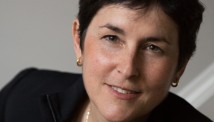 Frida Ghitis
Frida Ghitis It's hard to escape the impression that Iran and its close ally, Syria, are toying with the U.S.
America is earnestly seeking a diplomatic solution. And we should all hope diplomacy succeeds in securing an agreement that stops the carnage in Syria and one that prevents Iran from becoming a greater threat to its neighbors. But there is a reason these efforts are already running into trouble.
Secretary of State John Kerry is valiantly pursuing the suit-and-tie approach to peace, but Kerry is handicapped by the growing perception that Obama will not use military force under any circumstances. The U.S. doesn't need to release bombs to show it is powerful. What it needs to do is remind its adversaries, its enemies, that it has options beyond the well-appointed rooms of hotels along Lake Geneva.
Obama can do this by speaking directly and firmly about those choices. That alone would go a long way in reshaping some points of views, and could produce results. If it doesn't, more concrete steps would be required, from increasing material support for specific anti-al-Assad forces to a tightening of sanctions against Iran and other steps.
Diplomats can help concentrate the mind of their interlocutors when the people on the other side of the table worry about the possible cost of failure.
This is true of Syria's al-Assad, who has heard Obama's threats on the use of chemical weapons starting in the summer of 2012, and is still playing games with America while relentlessly slaughtering and starving his people.
And it is true about Iran, which just heard Obama during the State of the Union threaten to veto a plan to set the stage now for additional sanctions against Iran if negotiations fail in the next six months. Iranian officials presumably also heard the president state what so many have stopped believing: that he is prepared "to exercise all options to make sure Iran does not build a nuclear weapon."
Iran foreign minister says Obama's remarks are for "domestic consumption"
The more we hear from the Iranians, the less likely it seems that a successful agreement can be reached.
After CNN's Fareed Zakaria talked to Iranian President Hassan Rouhani last week, he concluded there's a "train wreck" on its way in negotiations. The U.S. is moving forward on the assumption that a deal would involve the dismantling of some key nuclear facilities, but Rouhani, the moderate face of the Islamist Republic, made it "categorically, specifically and unequivocally" clear that Iran has no intention of ever rolling back its nuclear program.
 Playing for time with human lives
Playing for time with human lives  A Syrian refugee's story
A Syrian refugee's story  Satellite photos show Syrian devastation
Satellite photos show Syrian devastation  What's behind the new al Qaeda warning?
What's behind the new al Qaeda warning? On Syria, I had heard rumors that the removal of its most terrifying weapons was not going as scheduled. Then an anonymous source told Reuters that the regime has delivered a dismal 4.1% of the 1,300 tons of toxic agents it has reported, "and there is no sign of more," on the way.
Then the U.S. confirmed it.
On Thursday, Ambassador Robert Mikulak, who heads the U.S. delegation to the Organization for the Prohibition of Chemical Weapons, told the group that Syria is ignoring the timeline for removal of banned weapons and displaying "a 'bargaining mentality' rather than a security mentality." In addition, he said, there is little progress on Syria's commitment to destroy its chemical weapons production facilities.
If Syria's games over its chemical weapons sound familiar -- agreements followed by "misunderstandings" and endless delays -- it is because we see much the same already unfolding with Iran.
Iran's President and foreign minister are well versed in their communications strategy with the West. They are charming and fluent, speaking directly to Western publics who would like nothing better than to be done with the threat of a confrontation. And how great it would be to truly resolve the issue diplomatically.
Hope, however, is not a strategy any more than closing your eyes when you don't like what you see, as when Iranian President Hassan Rouhani tweeted that in the Geneva agreement the "world powers surrendered" to Iran. That's when the White House dismissed the worrisome statement as a play for a domestic audience.
Since then, however, one after another Iranian official has maintained they have no intention of taking apart any of their nuclear program. Without destroying any centrifuges, reactors, or other facilities, Iran can negotiate with the West, and receive political, diplomatic and economic benefits from the loosening of sanctions, as it already has. And then, as top Iranian officials have said, it can reverse any freeze and resume high-level enrichment in 24 hours. That's the vow from the top nuclear negotiator and the foreign minister.
Making matters worse, much worse, we have just learned that American intelligence officials believe Iran has essentially already reached the "nuclear breakout" capability it sought. Director of National Intelligence James Clapper told Congress this week that Iran has made "technical progress in a number of areas -- including uranium enrichment, nuclear reactors, and ballistic missiles -- from which it could draw if it decided to build missile-deliverable nuclear weapons." In other words, he concluded, the only thing between Iran and nuclear weapons is a political decision to build the bomb. Everything else is already in place.
That extraordinary revelation received little attention in the U.S., where the headlines were consumed with the crisis in ice-logged Atlanta. In other places, the news was cause for alarm. "Heaven help us," tweeted a respected Israeli journalist, "Iran can now build and deliver nukes."
How is it possible that Iran and Syria are getting away with this?
Iran and Syria are not the only countries convinced that the U.S. will not take military action. Saudi Arabia apparently has reached much the same conclusion.
After his 2012 red lines became blurred, the deal to get rid of al-Assad's chemical weapons allowed Obama to claim he had succeeded in showing consequences for their use, even if al-Assad stayed in place and the killing continued. But now it looks as if essentially nothing has changed. Except that tens of thousands more have died.
To support American diplomacy, Obama needs to erase that image of a weak America. Again, there is no need to launch attacks and deploy troops. But there is a need to show to America's enemies they cannot play the U.S. for a fool. The President needs to assert convincingly that he will be able to exercise power if that becomes necessary. Nothing would be more helpful to the chances for diplomatic success.
Follow us on Twitter @CNNOpinion.
Join us on Facebook/CNNOpinion.
Did Beatles push black music aside?
Posted by Unknown
Editor's note: Elijah Wald is a writer and musician. His books include "How the Beatles Destroyed Rock 'n' Roll: An Alternative History of American Popular Music," "Escaping the Delta: Robert Johnson and the Invention of the Blues," and co-writer, with Dave Van Ronk, of "The Mayor of MacDougal Street," a posthumous memoir of folksinger Dave Van Ronk, which inspired the Coen Brothers' film "Inside Llewyn Davis." Watch "The Sixties: The British Invasion" on CNN, Saturday at 8 p.m. and 11 p.m.
(CNN) -- The Beatles invented rock music as we know it, and as pretty much everyone has known it since the mid-1960s. But because their success was so revolutionary, it's hard to remember where the music seemed to be headed before they arrived in the United States 50 years ago -- or to imagine what might have happened if they had not.
There are some familiar myths: One is that by 1964 rock 'n' roll had become insipid music dominated by teen idols like Frankie Avalon and Fabian, and the other is that the Beatles introduced white American teenagers to the power of black music. In fact, the rock 'n' roll scene had become increasingly integrated through the early 1960s, to the point that in late 1963 Billboard magazine stopped publishing separate pop and R&B charts because so many of the same records were on both.
 Elijah Wald
Elijah Wald The big new sound in rock 'n' roll was Motown, and James Brown was coming up strong, having broken onto the pop charts with his "Live at the Apollo" album.
Back then, pop prophets were divided into roughly two camps: Some predicted that African-American artists would increasingly dominate the rock 'n' roll scene, providing a joyously danceable soundtrack to the broader story of a triumphant civil rights movement. Others continued to optimistically predict the demise of rock 'n' roll, pointing to all the young people who were abandoning teen dance music for more mature and intelligent styles like folk and jazz. All agreed that the teens buying rock 'n' roll singles and dancing up a storm to the Supremes were the opposite of the serious folk and jazz fans buying LPs and discussing them endlessly in college dorms.
That divide seemed unbridgeable: People who loved rock 'n' roll thought of it as thrilling, fun, youth music, and expected adults to hate it, while people who appreciated adult styles considered them an antidote to the stupid noise on the radio. The few who imagined rock 'n' roll growing up thought it would take the path of jazz, getting hipper, blacker, and more melodically and harmonically complex. But most people assumed it would remain kid's music and even its most passionate acolytes would grow up to prefer other styles.
No one could have dreamed that rock 'n' roll would be reshaped as a sophisticated British import, or that anyone would want to mingle the already old-fashioned sound of Chuck Berry with baroque string quartets, Indian sitars and avant-garde poetry.
The Beatles were not only unimagined, but unimaginable.
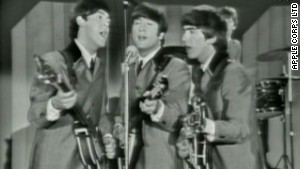 50th Anniversary of Beatlemania
50th Anniversary of Beatlemania 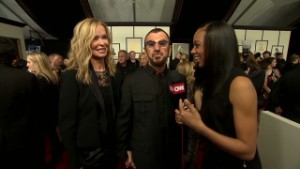 Ringo Starr's shout-out to Wolf Blitzer
Ringo Starr's shout-out to Wolf Blitzer 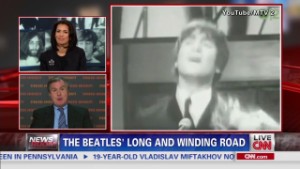 Revoluntionary impact of The Beatles
Revoluntionary impact of The Beatles 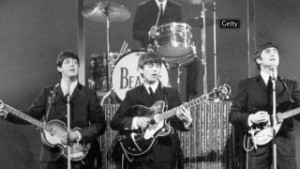 Working for the Beatles
Working for the Beatles It took the Beatles a couple of years to evolve from peppy rockers to psychedelic culture-trippers, but they transformed Americans' image of rock 'n' roll within hours of stepping off the plane at Kennedy Airport. Previous rockers had been famously inarticulate -- in the movie "Jailhouse Rock," when a group of college professors asked Elvis what he thought of Dave Brubeck, his response was to sullenly slam out of the room, sure that they were laughing at him.
The Beatles, by contrast, were witty and urbane. When reporters asked them silly questions about their long hair and screaming female fans, they responded with elegant mockery. Their Liverpool accents may have struck Britons as provincial and working class, but to Americans they sounded dazzlingly sophisticated.
The Beatles backed up their exotic charm with brilliant music, but at least for the first couple of years that was somewhat secondary -- witness the success of fellow invaders like Herman's Hermits and the Dave Clarke Five. They had lovely harmonies and interesting melodies, but in retrospect those early records sound no more advanced or earthshaking than what was coming out of Motown, and "Yesterday" sounds positively archaic next to "Papa's Got a Brand New Bag."
The change that redirected the course of American pop was this: By 1965, the year those two records appeared, the British Invasion had resegregated the charts and no one was comparing the Beatles to James Brown. They are remembered as rock 'n' rollers, he is remembered as playing soul and funk. The Brits didn't do that on purpose -- they loved contemporary African-American styles (the Beatles told 16 Magazine that Brown was their favorite singer) -- but they couldn't manage the tricky new rhythms, so they fell back on older varieties of blues and rock 'n' roll.
For dancers, that made their music relatively boring, and after the first wave of Beatlemania the twisting, frugging girls abandoned them for Motown, then moved on to funk and disco.
But their blues-based, guitar-driven sound and increasingly adventurous lyrics created an unexpected bridge to the folk crowd -- they inspired Dylan to go electric, he inspired them to write obscure poetry instead of poppy love lyrics, and rock became music that boys discussed seriously in dorm rooms.
Every revolution has winners and losers. A generation of black musicians remembers the Beatles' arrival as an apocalypse, the moment when rock 'n' roll became white and they were banished to a lower-status ghetto labeled R&B or soul. On the other hand, millions and millions of listeners all around the world remember the Beatles as leveling the divide between high art and street pop, paving the way for 50 years of rock innovation, and making some of the most spectacular music of the 20th century.
Follow us on Twitter @CNNOpinion.
Join us on Facebook.com/CNNOpinion.
Hundreds of snakes found in home
Posted by Unknown
Will this Super Bowl ad win $1M?
Posted by Unknown
Oscar nomination revoked
Posted by Unknown
(CNN) -- In a rare move, "Alone Yet Not Alone" is ending its Oscar run on a low note.
The Academy rescinded the best original song nomination for the film of the same name over accusations of improper campaigning.
Its board of governors voted Tuesday night after revelations that the song's composer, Bruce Broughton, e-mailed members during the voting period.
 Oscar nomination revoked
Oscar nomination revoked Broughton is a former member of the board.
"No matter how well-intentioned the communication, using one's position as a former governor and current executive committee member to personally promote one's own Oscar submission creates the appearance of an unfair advantage," said Cheryl Boone Isaacs, president of the Academy.
Any perceived campaigning is considered a rule violation.
"It is the Academy's goal to ensure that the Awards competition is conducted in a fair and ethical manner," the Academy said in a statement.
"If any campaign activity is determined by the board of governors to work in opposition to that goal, whether or not anticipated by these regulations, the Board of Governors may take any corrective actions ... to protect the reputation and integrity of the awards process."
No other song will be nominated in its place.
Though rare, this is not the first time the Academy has revoked a nomination.
In 1992, "A Place in the World" lost its Oscar nomination for best foreign-language film over questions over whether it was produced in Argentina, and not Uruguay as it had designated itself.
5 things we learned from Oscar nominations
Super Bowl: 7 commercials to watch
Posted by Unknown
(CNN) -- Our favorite Sunday of the year will arrive on February 2, and we're already armed with snacks and snark to dissect the best part of Super Bowl XLVIII: its commercials.
There will be the usual deluge of movie trailers -- expect to see clips for Darren Aronofsky's "Noah" movie as well as Kevin Costner's "Draft Day" -- plus the ad spots shilling beer, M&Ms and everything else.
Here are seven clips that we're looking forward to watching all over again:
Budweiser's puppy love
C'mon people. This has small furry creatures, adoption and interspecies bonding. We've long awaited the moment when the Super Bowl gives up on football and just makes the Puppy Bowl the main event, and we consider this Budweiser commercial to be the first step toward that glorious day.
The Muppets steal a car
The Muppets are mostly around for fun, but they often sneak in a lesson or two while they're at it. With their Super Bowl commercial, they impart a very useful one: do not, under any circumstances, pull over for a Muppets bus -- unless you want them to hijack your car. (On the other hand, if your car is hijacked by Muppets, at least you'll get a groovy song out of it.)
Anna Kendrick's 'non-Super Bowl' Super Bowl commercial
We love this Newcastle Brown Ale ad for so many reasons, but we're only going to give you our top three: 1) It stars Anna Kendrick. 2) It stars Anna Kendrick basically giving the "am I beer commercial hot?" monologue we give ourselves every morning. 3) It stars Anna Kendrick giving the only appropriate response to that: "I mean I'm hot ... But like ... beer commercial hot? No. But I love a challenge."
The 'Full House' reunion
We haven't seen Bob Saget, Dave Coulier and John Stamos -- aka "Full House's" Danny Tanner, Uncle Joey and Uncle Jesse -- together like this since "Full House" went off the air almost 19 years ago, so excuse us while we're going to soak up as much of this minireunion as possible. If we're lucky, maybe Saget and Coulier will join Stamos in his Dannon Oikos spokesman duties full-time.
'Draft day' trailer
If the marketing team behind Kevin Costner's upcoming dramedy "Draft Day" didn't find a way to advertise during the Super Bowl, we'd question their devotion to the job. The film, directed by Ivan Reitman and also starring Jennifer Garner and Ellen Burstyn, features Costner as the general manager of the Cleveland Browns as he grapples with the responsibility of having the No. 1 draft pick. We're getting shades of "Jerry Maguire" from this movie, and we like it.
'Noah' trailer
Admittedly, the promotion for "Noah" is a bit of a downer (#TheFloodIsComing? That's a great thought to have during the Super Bowl), but we can't help but be excited to see what Darren Aronofsky's going to do with this classic Biblical story. Stars include Russell Crowe, Jennifer Connelly and Emma Watson. The film will arrive in theaters on March 28.
Ellen's Beats Music commercial, with bears
Ellen DeGeneres is a self-described fan of the new Beats Music app, and she shot a Super Bowl ad to show just how much she loves it. Playing what appears to be a modern-day Goldilocks who likes to hang out at a place called The Woods (we think we've been there ...), DeGeneres grooves to pop music with some hipster bears.
Which commercials are you looking forward to watching on Sunday?
Are you a Super Bowl ad expert?
A mom's story: Raising Matt Damon
Posted by Unknown
Editor's note: Nancy Carlsson-Paige is professor emerita of early childhood education at Lesley University in Massachusetts. Her most recent book is called "Taking Back Childhood: A Proven Roadmap for Raising Confident, Creative, Compassionate Kids."
(CNN) -- People often ask me, especially after another young celebrity takes a fall, "How did you raise two talented artists, both wonderful fathers, who both do such good work in the world?" (One of my sons is the actor Matt Damon, the other, Kyle, is a sculptor). So many young stars seem to struggle and stumble under the pressure of their fame. Why do some handle it well while others go off the rails?
There's no simple answer to this question. A lot happens in our children's lives that we parents can't control. From the beginning, children come to us with different personalities and temperaments; they are born into different cultures and economic circumstances. But we parents are the most important influence in their early lives, and what we do affects how our kids learn to handle the stresses life brings, whatever paths their lives take.
 Nancy Carlsson-Paige
Nancy Carlsson-Paige One dimension of healthy childhood that gives kids a solid footing in life is having lots of child-centered play throughout the early years and even into grade school. Play is the most important vehicle children have for coping with life and making sense of it.
Matt played pretend games for hours every day for many years -- making up stories, taking on roles and re-working his experiences in creative ways. Not only did all this play help build a strong sense of inner security in Matt, it also built up his capacity to imagine, create and invent ideas.
I believe these years of child-centered play helped Matt become the actor and grounded person he is today. It is of great concern to me that there is less play in children's lives today than a generation ago. The hours spent in front of screens have replaced playtime outside school, and too much focus on academics and testing has eroded playtime inside schools.
I believe that these years of child-centered play helped Matt become the actor and grounded person he is today.Nancy Carlsson-Paige
When kids are confused or scared or they don't understand things, they work it out in their play. Using their imagination, they rework things until they feel some sense of mastery. This is kids' ongoing way of coping with life and it is crucial for building inner resilience and security.
That inner strength and resilience begins to develop at birth. It is first felt as a sense of trust in others -- adults who respond to cries of hunger and who can provide a home, safety and health.
As time goes on, kids start to carry that security with them on the inside. Security will grow or weaken in childhood depending a lot on how we adults relate to our children in everyday interactions. When we are too heavy-handed with our authority, kids often feel insecure or fearful. When we punish them or use threats and timeouts or other coercive tactics, they might try to obey on the surface, but they aren't building the inner strength and confidence that will be their moral compass when we are not there.
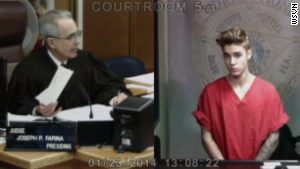 Could Justin Bieber be deported?
Could Justin Bieber be deported?  Bynes' parents seek conservatorship
Bynes' parents seek conservatorship We don't really have to over-use our adult authority with children. We can work out most things with them -- listening to their feelings and needs and taking these into account as much as possible. When we listen to kids with our full attention and try to say back to them what we heard without judging it or giving our own opinion, they feel great trust in us and in themselves. And this kind of listening prevents many conflicts from escalating or from happening in the first place. Of course children need limits, but not the kind that are imposed by "Do as I say."
Recently I was walking on busy streets with my 5-year-old grandson Jake. He pulled his hand from mine. I asked, "You don't want to hold my hand?" "No," he said, "I want to walk by myself." I said, "How about this: On the sidewalk you walk alone and when we cross the street, you hold my hand, because there are so many cars zooming around." Jake nodded yes and took my hand when we got to the street. This simple example shows a way of being with children, of being on the same side with them, working things out with them -- something we can do almost all the time. It is a way of being that helps to strengthen children's inner security and confidence in their own ideas.
Schools are the other big influence in our children's lives. Children spend about half their waking hours in school and what happens there has a big part to play in the inner confidence and social responsibility they develop.
I sent my sons Kyle and Matt to a public high school where community participation, respect for differences, learning empathy and concern for others were part of daily school life. The school had an excellent drama program, another reason why I wanted to send Matt there.
All kids who wanted to participate in the school's stellar ensemble productions could. Matt wasn't a "star." He was on equal footing with all the other kids. Stardom can be confusing for a teen -- it's a time of figuring out who you are and how you fit into what suddenly seems like a much bigger world. Matt's high school drama experiences gave him a rock solid start in theater -- he worked hard at his craft and found delight and meaning in collaboration.
Matt Damon: Together we can solve the world water crisis
I believe that schools should be places not only for academic learning, but also where young people build confidence, a sense of self, and learn to become responsible citizens. It is one of the great tragedies of our day that our schools, excessively driven by data and standardized tests, have no time for activities that can't be tested. No time for the arts and play and the social and emotional learning that will help children handle what life has in store.
Although we parents can't control everything that happens in our kids' lives, we can do a lot to help them build inner security, confidence and a strong inner moral compass that will guide them through challenges they will face when we are no longer there. And our schools should build on this foundation. We should insist that our schools address not just academics, but the whole child -- so that all our children can become healthy and strong and enter adulthood as responsible and caring citizens.
Follow us on Twitter @CNNOpinion.
Join us on Facebook/CNNOpinion.
A city's total lack of preparedness
Posted by Unknown
Editor's note: David Levinson is a professor in the Department of Civil Engineering at the University of Minnesota and director of the Networks, Economics and Urban Systems Research Group, or NEXUS. He has authored or edited several books, including "Planning for Place and Plexus: Metropolitan Land Use and Transport." He is the editor of the Journal of Transport and Land Use. He blogs at Transportationist.
(CNN) -- It's just water.
Of course it is frozen in the form of ice. Driving on ice is a fool's errand. On ice it is hard to stop (or start) moving. On ice, vehicle control is difficult at best. You don't need to be a transportation engineer to know that crashes increase with snow and especially ice, with its reduced friction. The problem is not that Atlanta got snow, but that the snow turned into ice.
Should Atlanta have been better prepared? In retrospect, the answer is obvious. In prospect it should have been as well.
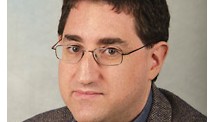 David Levinson
David Levinson While it's hot in the summer, Atlanta is in the foothills of the Appalachians, not the beaches of the Caribbean. In the past eight decades, it has snowed 4 inches or more 11 times in Atlanta. There are periodic ice storms. According to Weatherspark, the average low temperature in January is 34 degrees F, just above freezing. In other words, half the time in January the daytime low is below 34.
I lived in Atlanta for five years. As a freshman, I remember a cold spell in January 1985, when Ronald Reagan's second inauguration was canceled in Washington because of cold, and Georgia Tech, where I was a student, had a delayed opening because it was 8 degrees. So winter is something that leaders should be aware of in Georgia.
Atlanta does not get as much snow as Minneapolis, my current home, and where we have stared down a polar vortex, and are now blanketed with about 2 feet of snow. Atlanta is certainly not as cold as Minneapolis, where unusually, school was canceled two days this week, and five days this school year, and we now look at ice planet Hoth (where Luke Skywalker and friends were based at the opening of "The Empire Strikes Back") as an improvement. But Atlanta still experiences winter. Atlanta still has access to forecasts from the National Weather Service. This storm was not a surprise.
 Blizzard of blame
Blizzard of blame There are several strategies for dealing with ice storms.
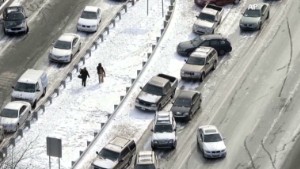 Ice storm chaos in Atlanta
Ice storm chaos in Atlanta  Dude, where's my car?
Dude, where's my car? Officials could have tried to prevent the ice. Unfortunately weather control is not yet very practical.
The city and state could have tried to mitigate the ice. There are many techniques for salting and sanding roads that either prevent ice from forming, melt the ice or make it easier to travel on ice. This requires a fleet of vehicles and drivers that are prepared well before the weather event and that continue to be deployed until the roads are cleared.
The risk is the city and state spend money on preparations for bad weather that does not come. Such spending is standard operating procedure in northern cities such as Minneapolis, where snow and ice are almost guaranteed, but it may not be worthwhile if the ice is infrequent.
Opinion: When 2.6 inches of snow made hell freeze over
Atlanta could have tried to avoid the ice. If officials knew ice was coming (and they should have, the weather forecasts were not highly guarded state secrets), they should have canceled schools and encouraged people to stay home. The risk is you cancel school and it only rains, or the storm changes course. Officials who cancel school, only to see the weather improve, look bad, are considered "fraidy-cats," will be mocked by talking heads and Monday morning quarterbacks, and more importantly will have a harder time making the right decision the next time.
A real leader is not so insecure. New York Mayor Michael Bloomberg warned his city about Sandy despite perhaps being (in retrospect) too conservative in his warnings about Irene.
Is missing a day of school, or working from home instead of the office really the end of the world?David Levinson
In the end, we should ask: Is missing a day of school, or working from home instead of the office really the end of the world?
Instead what officials in Georgia did was accept the damage (in the form of traffic congestion, crashes, people sleeping in place in their cars and schools instead of at home) caused by the ice. This outcome required no advance preparation or forethought. In fact a debacle of this magnitude required a careful absence of preparation.
Worse, everything shut down at once. Dismissals were not coordinated, exacerbating congestion. In the end though, the main problem was not that everyone left work and school at the same time. The problem was they were all there in the first place.
In the long term, the Atlanta area could do much more to avoid its routine congestion. But in the short term, if you cannot prevent the special congestion caused by the weather, avoid it.
Is weather getting weirder? I don't know.
Is weather getting more predictable? Most definitely. The science is improving, and the measurements are getting more precise, and there are many more of them, all of which make short-range forecasts very accurate. Our politicians should listen to the scientists sometimes.
Follow us on Twitter @CNNOpinion.
Join us on Facebook/CNNOpinion.
A flake of snow, then Armageddon
Posted by Unknown
Editor's note: Melissa Fay Greene is a nonfiction writer and a two-time National Book Award finalist. Some of her books are "Praying for Sheetrock," "The Temple Bombing," "There Is No Me Without You," and "No Biking in the House Without a Helmet."
(CNN) -- Here's where things went wrong: On Tuesday, January 28, 2014, at 1:30 in the afternoon, in response to the sparkle of several snowflakes in the air above Atlanta, virtually the entire adult population of America's ninth most populous metro area stood up, left their workplaces, got into their cars, and created a traffic deadlock of legendary proportions.
Good news for New Jersey Gov. Chris Christie that he was nowhere near here at the time, nor could he be linked via administrative assistants to our wintry surprise. But among Great Traffic Jams of the 21st Century, move over Fort Lee, New Jersey.
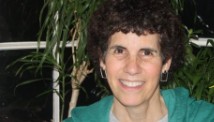 Melissa Fay Greene
Melissa Fay Greene My friend Johanna Norry, a Georgia State University grad student, tried to leave her parking place on a downtown parking deck and traveled -- in one hour and seven minutes -- 23 feet. My friend Elida Baverman posted on Facebook: "Six hours and 18 minutes to get home from Perimeter Mall. Wish my car made it, too." My husband's law partner, Ed Garland, inched along I-75 north toward home from 5 p.m. Tuesday until 1 a.m. Wednesday, at which point his car ran out of gas. He abandoned it and set off on foot through the snowdrifts, reaching his home at 2 in the morning.
What other cities can learn from Atlanta's ice debacle
By all accounts -- I wasn't going out there -- the city's throughways on Wednesday looked like parking lots, where cars with empty gas tanks sat frozen in the Arctic air. (It was 16 degrees Fahrenheit Wednesday morning.) Some of the cars had been abandoned; others might have still had people in them. "If you are stranded and cannot get through to 911," announced the Atlanta Police Department, "please send the Atlanta Police Department a message through Facebook or Twitter."
One can only imagine: #GetMeTheHellOutofAtlanta.
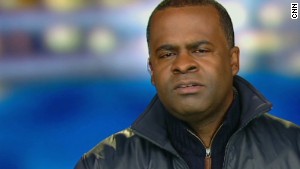 Mayor Reed: Atlanta is up and running
Mayor Reed: Atlanta is up and running 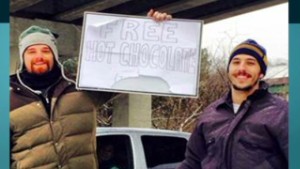 Hot chocolate given to stranded drivers
Hot chocolate given to stranded drivers 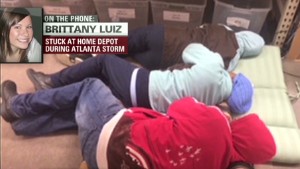 Snowstorm sleepover at Home Depot
Snowstorm sleepover at Home Depot A special Facebook page, "SnowedOutAtlanta," was created to connect the cold, stranded, and demoralized with the warm, housebound, and generous. People in vast traffic jams, with taillights twinkling in endless lines toward every horizon, not only sat in cars steadily running out of gas, they called for help and comfort on cell phones running out of juice. Thus most people seeking help online did so for third parties: "My boyfriend has been stuck in traffic for nine hours now," wrote a woman named Laura. "He has a heart condition and told me he's starting to feel lightheaded."
Some posted longingly: "My husband left work yesterday at 4 p.m," a woman wrote in at 9 a.m. Wednesday morning. "Of all days he left his phone at home. ... He had no means of getting in touch with me. If anyone has seen or heard from him, please reply."
Scores of people wrote to offer beds and meals to freezing, stranded travelers. Many offered to drive to pickup points to meet the strangers. Home Depot announced all stores would remain open all night, offering warmth and shelter. Photos surfaced of people in their business clothes asleep on the floor in the aisles of CVS drugstores.
A bakery owner offered to donate goods to any place stranded people were gathering. "Warm home, food, and phone to anyone who needs it!" posted a woman in Monroe, Georgia.
Was Atlanta asleep at the wheel?
"My sister has been stuck in her car since 4:30 p.m. yesterday," posted a woman named Valencia on Wednesday, 17 hours after her sister got on the road. "Nothing to eat. She's nearly out of gas. She is diabetic. Does not have her meds. Can someone please help? She's at Memorial Drive by Alonzo Crim School. Please somebody?"
"Lawd I'm praying!" was the first response, from a woman named Kye, after which a woman named Keirsten posted: "I can walk to her! Call me. Trying to find insulin!" Then: "Sending people that way now. What kind of car and where?"
"Champagne-brown Infinity. She made it to the gas station across from AutoZone."
"My friend Jessica is walking that way right now."
"Thank you! You found her!" posted Valencia; then, a bit later: "She made it home! Praise God!! ... Good people still left in this world!"
The landscapes and language of apocalypse -- many headlines compared Atlanta to a scene in "The Walking Dead" -- bore no relation to the footage, the yardage, the square ... inchage of snow actually dumped on the city.
How much snow fell? What quantity of snow do you think it takes to paralyze a metropolitan area of 5,490,000 citizens? What kind of whiteout does it take to halt every artery and interstate of this national traffic hub, this city that is home to a highway intersection known as "Spaghetti Junction" and to a college (Georgia Perimeter) and a former Atlanta Braves player ("Perimeter" Perez) both named after Interstate 285?
How much snow did it take to strand thousands of children overnight in their schools, send trucks and buses spinning out of control on surface streets and highways, decree that a baby should be born in a car trapped by traffic gridlock, and inspire Gov. Nathan Deal to declare a statewide State of Emergency and to call out the National Guard? It was 2.6 inches, OK? Or, as some news sources reported, "up to 3 inches," a bit of forgivable inflation that would seem to suggest it might have been quantities up to and including 2.9 inches. Nearly 3!
But it doesn't take depth of snow to ice the streets, and it doesn't take a blizzard to panic the citizenry in a city without snowplows, snow shovels, windshield ice scrapers, or even, seemingly, a product known as "salt." Just a sprinkling of snow will do, a delicate frosting, a few curlicues from Jack Frost -- and here we are, immobilized, freezing, turning in desperation to strangers and Home Depot.
Opinion: Stranded in Atlanta
I wasn't on the road Tuesday. And I woke up to 46-degree weather, not 16. But the 46-degree weather was in my bedroom because our furnace died during the night. Two weeks ago, when a deep freeze rolled across Atlanta, our pipes burst. We seem to be living in close synchrony with every national weather event.
So while tens of thousands of our fellow citizens rumbled nowhere, I screened "How to Fix Your Own Furnace" videos on Youtube. Inspired, I descended into the freezing basement and spent 15 minutes trying to remove the front of the furnace. Then my husband unscrewed a protruding screw and it fell off.
I peered deep into the machinery of the still and very cold machine and confirmed by phone that no repair person south of the Mason-Dixon Line could travel the treacherous roads to our house.
My husband, children, two dogs, two cats, and I huddled around electric space heaters all day. As I type, my feet are wrapped in a blanket and a space heater is warming a 4-inch stretch on the side of my right leg. My teenage daughter has spent the day wrapped in an electric blanket on the sofa, with the dachshund wrapped inside it, too.
But it could be worse. I could be on I-285.
Follow us on Twitter @CNNOpinion.
Join us on Facebook/CNNOpinion.
Mom's story: Raising Matt Damon
Posted by Unknown
Editor's note: Nancy Carlsson-Paige is professor emerita of early childhood education at Lesley University in Massachusetts. Her most recent book is called "Taking Back Childhood: A Proven Roadmap for Raising Confident, Creative, Compassionate Kids."
(CNN) -- People often ask me, especially after another young celebrity takes a fall, "How did you raise two talented artists, both wonderful fathers, who both do such good work in the world?" (One of my sons is the actor Matt Damon, the other, Kyle, is a sculptor). So many young stars seem to struggle and stumble under the pressure of their fame. Why do some handle it well while others go off the rails?
There's no simple answer to this question. A lot happens in our children's lives that we parents can't control. From the beginning, children come to us with different personalities and temperaments; they are born into different cultures and economic circumstances. But we parents are the most important influence in their early lives, and what we do affects how our kids learn to handle the stresses life brings, whatever paths their lives take.
 Nancy Carlsson-Paige
Nancy Carlsson-Paige One dimension of healthy childhood that gives kids a solid footing in life is having lots of child-centered play throughout the early years and even into grade school. Play is the most important vehicle children have for coping with life and making sense of it.
Matt played pretend games for hours every day for many years -- making up stories, taking on roles and re-working his experiences in creative ways. Not only did all this play help build a strong sense of inner security in Matt, it also built up his capacity to imagine, create and invent ideas.
I believe these years of child-centered play helped Matt become the actor and grounded person he is today. It is of great concern to me that there is less play in children's lives today than a generation ago. The hours spent in front of screens have replaced playtime outside school, and too much focus on academics and testing has eroded playtime inside schools.
I believe that these years of child-centered play helped Matt become the actor and grounded person he is today.Nancy Carlsson-Paige
When kids are confused or scared or they don't understand things, they work it out in their play. Using their imagination, they rework things until they feel some sense of mastery. This is kids' ongoing way of coping with life and it is crucial for building inner resilience and security.
That inner strength and resilience begins to develop at birth. It is first felt as a sense of trust in others -- adults who respond to cries of hunger and who can provide a home, safety and health.
As time goes on, kids start to carry that security with them on the inside. Security will grow or weaken in childhood depending a lot on how we adults relate to our children in everyday interactions. When we are too heavy-handed with our authority, kids often feel insecure or fearful. When we punish them or use threats and timeouts or other coercive tactics, they might try to obey on the surface, but they aren't building the inner strength and confidence that will be their moral compass when we are not there.
 Could Justin Bieber be deported?
Could Justin Bieber be deported?  Bynes' parents seek conservatorship
Bynes' parents seek conservatorship We don't really have to over-use our adult authority with children. We can work out most things with them -- listening to their feelings and needs and taking these into account as much as possible. When we listen to kids with our full attention and try to say back to them what we heard without judging it or giving our own opinion, they feel great trust in us and in themselves. And this kind of listening prevents many conflicts from escalating or from happening in the first place. Of course children need limits, but not the kind that are imposed by "Do as I say."
Recently I was walking on busy streets with my 5-year-old grandson Jake. He pulled his hand from mine. I asked, "You don't want to hold my hand?" "No," he said, "I want to walk by myself." I said, "How about this: On the sidewalk you walk alone and when we cross the street, you hold my hand, because there are so many cars zooming around." Jake nodded yes and took my hand when we got to the street. This simple example shows a way of being with children, of being on the same side with them, working things out with them -- something we can do almost all the time. It is a way of being that helps to strengthen children's inner security and confidence in their own ideas.
Schools are the other big influence in our children's lives. Children spend about half their waking hours in school and what happens there has a big part to play in the inner confidence and social responsibility they develop.
I sent my sons Kyle and Matt to a public high school where community participation, respect for differences, learning empathy and concern for others were part of daily school life. The school had an excellent drama program, another reason why I wanted to send Matt there.
All kids who wanted to participate in the school's stellar ensemble productions could. Matt wasn't a "star." He was on equal footing with all the other kids. Stardom can be confusing for a teen -- it's a time of figuring out who you are and how you fit into what suddenly seems like a much bigger world. Matt's high school drama experiences gave him a rock solid start in theater -- he worked hard at his craft and found delight and meaning in collaboration.
Matt Damon: Together we can solve the world water crisis
I believe that schools should be places not only for academic learning, but also where young people build confidence, a sense of self, and learn to become responsible citizens. It is one of the great tragedies of our day that our schools, excessively driven by data and standardized tests, have no time for activities that can't be tested. No time for the arts and play and the social and emotional learning that will help children handle what life has in store.
Although we parents can't control everything that happens in our kids' lives, we can do a lot to help them build inner security, confidence and a strong inner moral compass that will guide them through challenges they will face when we are no longer there. And our schools should build on this foundation. We should insist that our schools address not just academics, but the whole child -- so that all our children can become healthy and strong and enter adulthood as responsible and caring citizens.
Follow us on Twitter @CNNOpinion.
Join us on Facebook/CNNOpinion.